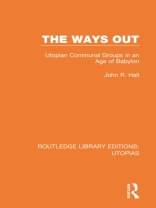A comparative analysis of both secular and religious communal groups in contemporary America, this study, originally published in 1978, shows that contemporary communalists stand in relation to collectivism much the same as early Protestants stood in relation to individualism – as the self-proclaimed pioneers of the new age. There is great diversity among communal groups, a diversity which is found to stem from alternative orientations towards time and alternative assumptions about the cognitive status of the social world.The author has made use of a phenomenologically derived typological framework to organize the data he has obtained through living in and visiting a number of communal groups. Within this framework, Alfred Schutz’s ‘mundane’ phenomenology and Max Weber’s interpretive sociology are employed as ways of approaching the situated sociology of knowledge in various communal groups.Six ideal types of communal groups are described: the commune, the intentional association, the community, the warring sect, the other-worldly sect and the ecstatic association. Two of these types – the intentional association and the community – are identified as participants’ efforts to demonstrate ‘worldly utopian’ models for the reconstruction of society at large.
John R. Hall
Ways Out [PDF ebook]
Utopian Communal Groups in an Age of Babylon
Ways Out [PDF ebook]
Utopian Communal Groups in an Age of Babylon
Achetez cet ebook et obtenez-en 1 de plus GRATUITEMENT !
Langue Anglais ● Format PDF ● Pages 290 ● ISBN 9781000734348 ● Maison d’édition Taylor and Francis ● Publié 2019 ● Téléchargeable 3 fois ● Devise EUR ● ID 7290941 ● Protection contre la copie Adobe DRM
Nécessite un lecteur de livre électronique compatible DRM












